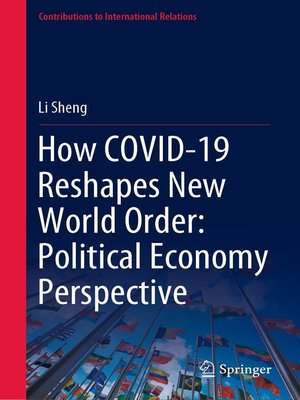How COVID-19 Reshapes New World Order
ebook ∣ Political Economy Perspective · Contributions to International Relations
By Li Sheng

Sign up to save your library
With an OverDrive account, you can save your favorite libraries for at-a-glance information about availability. Find out more about OverDrive accounts.
Find this title in Libby, the library reading app by OverDrive.



Search for a digital library with this title
Title found at these libraries:
| Loading... |
This timely book explores economic, political, social, and cultural impacts of the COVID-19. It aims to reveal a future world shaped by the worldwide pandemic.
The main content of this book is divided into 5 parts: the pandemic—a short sketch of the pandemic through 2020, the acceleration of the global power transition: from East to West, comparison between authoritarian and democratic in the pandemic era, global international organizations under the COVID-19 influence, and regional international organizations under the COVID-19 influence. In addition, this book also analyzes the impacts from two aspects: the changes of the world order and the repercussions for international organizations and globalization. Three questions will be focused: How the pandemic has changed the existing world order? What the new post-pandemic world order will be? How international cooperation has been affected and will be affected?
This book is a comprehensive study that investigates the impacts of the COVID-19 pandemic and the political implication on international organizations. It would not only inspire readers to think about impacts of the outbreak of COVID-19 from economic and political perspectives, but also encourage readers to have a deeper understanding of the global political pattern and potential changes of world order after the pandemic. Therefore, the intended readership not only includes the academics but also includes pro-academics. The academic audiences include university and college scholars (especially those majoring in history, political sciences, economics, and international relations), teachers, and administrative staff at the undergraduate, graduate, postgraduate, and Ph.D. levels, as well as study centers and research institutes and campus and public libraries. The pro-academic groups include civil servants, especially scholarly bureaucrats and technocrats; white collar and middle-class citizens interested in reading, especially thoseinterested in and concerned about current affairs; and international business elites.
The most important feature of this book is that it points out the COVID-19 pandemic has been shaping the world order. It also shows in the coming post-pandemic world, the United States would maintain the position of superpower while the still rising China is likely to share some responsibilities in constructing a new multi-polar world with US and other powers. The prevailing of unilateralism will heavily constrain the role of international organizations.






